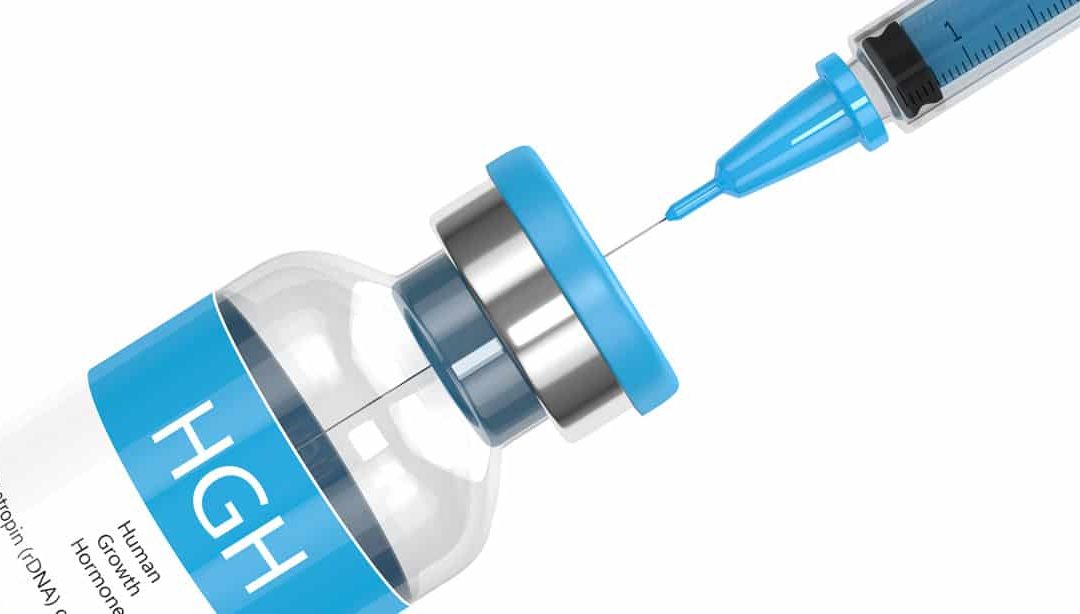The human body is fascinating. It produces over 50 hormones in different quantities for various purposes. Some of these include coordinating the body’s functions, ranging from metabolism to growth and development, emotions, mood, sexual function and even sleep. One such hormone, the human growth hormone (hGH), also known as somatotropin, is a hormone that’s produced by the brain’s pituitary gland. But what is hGH? In most children, it tends to occur naturally, helping them grow from children into adolescents during puberty, building muscle and bone mass, amongst other aspects. However, many adults believe that hGH is the so-called “fountain of youth”. A way of decreasing the aging process, increasing muscle mass size, decreasing weight and others. If you have burning questions about hGH, then this article is for you. Keep reading to find out more.
Side note: The contents of this article should not be construed as medical advice and you should always consult a medical specialist before proceeding with hGH treatment.
What is the human growth hormone?
hGH is a hormone, which is essentially a “chemical messenger” that travels up and down the body’s blood system, ensuring that organs and tissues function well. If you’re wondering where is the growth hormone produced, the quick answer is in the brain’s pituitary gland, or the “master gland”. This is a pea-sized gland at the base of the brain which regulates many bodily functions.
So, what does the human growth hormone do? When it occurs naturally in the human body, hGH helps children with muscle mass, bone density and growth as well as other aspects. Some children, however, produce either too little or too much of the hormone, leading to stunts in growth or excessive growth for one’s age compared to their peers.
Since this hormone is produced before and during adolescence to help a child reach their full physical stature, its production also tends to fade over time as the body does not need to continue growing. This has led some to believe that taking hGH can help with the aging process, build muscle mass, help with bone development and more, although such claims are unsubstantiated and have not been medically proven to be true.
How to increase the growth hormone
To increase the human growth hormone in a person’s body, whether a child or an adult, synthetic hGH can be used, although undergoing this treatment should only be done with a medical prescription. Synthetic growth hormone is believed to have first been introduced in 1985 and it is taken by injecting it into the system – whether intramuscularly or subcutaneously (under the skin). This should answer the question of where to inject hGH or how to inject hGH for bodybuilding. Depending on the person’s age, health condition and several other factors, medical hGH treatment can be performed either several times a week or several times per month. This will all depend on the hGH deficiency identified from blood, urine and saliva tests. After that, to determine how long does hGH take to work, the answer will depend and vary depending on the person. Some bodybuilders, for example, have seen results as quickly as one month after starting hGH treatment, while others have noted changes in the first three to six months.
So, how much hGH to take a day? The answer will vary. For example, adults who weigh 35 to 44 kg can typically receive 4 mg injected subcutaneously once a day at bedtime. Meanwhile, adults who weigh less than 35 kg will receive doses that are based on body weight and which have been determined as appropriate by one’s doctor. Usually, however, the quantity is 0.1 mg per kilogram of body weight, which is also injected under the skin at bed time – once per day. So ultimately, what is the optimal hGH dosage one should take? The answer isn’t as clear cut as it seems. It will vary from from 0.2 mg per day to around 1 mg per day and depend on criteria including the length of hGH therapy, individual tolerance, effectiveness and risk of side effects.
If you’re curious about how long does hGH stay in your system, some sources indicate that “the circulating half-life of hGH is relatively short half-life (20-30 minutes), while its biological half-life is much longer (9-17 hours) due to its indirect effects.”
Speaking of effects of hGH, what are some of the side effects or spin-offs that you can expect? Here is a non-exhaustive list:
- Nerve, muscle or joint pain
- Swelling in the arms and legs due to fluid in the body’s tissues
- Carpal tunnel syndrome
- Numbness and tingling of the skin
- High cholesterol levels
- Increased insulin resistance
- Type 2 diabetes
- Joint and muscle pain
- Enlargement of breast tissue (for men)
- Increased risk of certain cancers
And perhaps another important question to answer at this point is how to test if hGH is real. The most reliable option here is to take it to a laboratory.
Benefits of hGH: does it lead to weight loss and more?
Adults who have a growth hormone deficiency can benefit from hGH injections in order to increase exercise capacity, increase bone density, increase muscle mass and decrease body fat. However, this will all depend on the particular health condition and circumstances of each individual.
This brings us to the next point which is about weight loss, particularly for women. If you’d like to know how much hGH should a woman take to lose weight, it’s important to distinguish between those who have an hGH deficiency and are on medically prescribed hGH treatment and those who simply wish to lose weight. Regarding the former, the guideline for taking hGH treatment per body weight outlined above should come into play. However, when it comes to people wishing to lose weight, such as those who may be considered obese, studies have found that there is very little correlation between the two, if any. Meanwhile, if you’re asking yourself why am I gaining weight on hGH, the short answer to this question would be that hGH can lead to weight gain that mainly consists of fat, although a regimen of resistance exercise can help build leaner body mass.
What is the best age to start growth hormone treatment?
This question, although seemingly innocent, is rather broad and requires more careful consideration. For example, is the person taking growth hormone treatment a child or an adult? If an adult, how old are they? Furthermore, what is their overall health status? Are they male or female? And are they taking hGH as part of a medically prescribed procedure or as an initiative to help with weight loss, muscle gain, mood improvement and more? Ultimately, these are some of the questions that need to be answered before proceeding with such treatment.
hGH, steroids, testosterone and aging
For those wondering is hGH a steroid, it’s first important to distinguish between the different types of steroids. These are corticosteroids and anabolic-androgenic steroids (or anabolic steroids for short).
The former are usually consumed as tablets and these are considered a type of anti-inflammatory medicine that is used to treat problems including allergies, asthma, eczema, inflammatory bowel disease, Addison’s disease, arthritis, etc. Meanwhile, anabolic steroids are defined as “a synthetic steroid hormone which resembles testosterone in promoting the growth of muscle. Such hormones are used medicinally to treat some forms of weight loss and (illegally) by some athletes and sports players to enhance physical performance.”
Since hGH is not necessarily a steroid, but rather a hormone, the answer to the answer to the question of whether is hGH a testosterone is answered by the fact that testosterone is also a hormone that is steroidal, and whereas it can help with relatively rapid “increases in lean muscle mass and strength, restores libido and helps with things like erectile dysfunction in men,” hGH is more of a protein that is responsible for growth. However, it is considered a banned substance for athletes.
Regarding the question: does hGH help with erectile dysfunction, in short, the answer is yes. It is said that taking hGH treatments can help men enjoy a more fulfilling sex life, although it’s always highly recommended to speak to a medical specialist about this first. What’s more is that if you’re wondering does hGH increase testicle size, some studies have shown that this has been positive for pre-pubescent boys, although more research needs to be carried out for different aged male groups for more definitive answers. Furthermore, there are those who may wish to know: does hGH help low testosterone? This needs to be put in context as hGH essentially functions to help with building more muscle and burning fat, particularly in men. Finally, if you’re asking can I take testosterone and hGH, some sources indicate that you should take these two components together, particularly if you’re suffering significant deficiencies in either one or the other.
Another query that often pops up is does hGH increase facial hair? Men, in particular, may find that they do, in fact, experience more facial hair growth after starting hGH treatment.
And as a last point, the one we’ve all been waiting for, is the following: is hGH good for anti-aging? Although it makes sense to think that a hormone that helps with growth can also slow down the effects of aging, research shows that hGH should not be used to delay the aging process or to help with age-related matters, particularly in older adults.
Conclusion
And there you have it! Now that you know both sides of the coin when it comes to hGH treatment, you can make a more informed decision about your health and body. To find out more about where you can get hGH products, we encourage you to take a closer look here.








